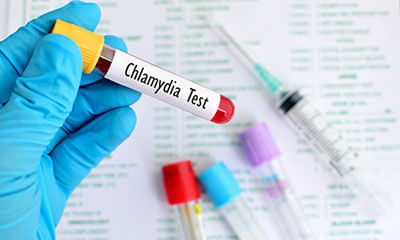What Is Chlamydia ?
What is Chlamydia ?
Chlamydia is one of the most common sexually transmitted diseases . This infection is easily spread because it often causes no symptoms and may be unknowingly passed to sexual partners. In fact, about 75% of infections in women and 50% in men are without symptoms.
Causes of chlamyadia :
Chlamydia may be transmitted by unprotected oral, anal, or vaginal sex with a person.
Genital contact can also pass on chlamydia
As chlamydial infection presents no symptoms in at least 70 percent of carriers, an infected person may pass it on to their sexual partner without knowing.
contact with a toilet seat that has been used by an infected person
sharing a sauna with infected people
sharing a swimming pool with infected people
touching a surface that an infected person had previously touched or coughed/sneezed on
standing close to an infected person, inhaling the air after they have coughed or sneezed
sharing an office with an infected colleague
An infected mother can pass the infection on to her baby during childbirth.
Sometimes, the infection leads to complications for the infant, such as pneumonia.
If a mother has a chlamydia infection during pregnancy, she will require a test 3 to 4 weeks after treatment to ensure the infection has not returned.
Chlamydia symptoms in women :
Abnormal vaginal discharge that may have an odor
Bleeding between periods
Painful periods
Abdominal pain with fever
Pain when having sex
Itching or burning in or around the vagina
Pain when urinating
Chlamydia symptoms in men :
Small amounts of clear or cloudy discharge from the tip of the penis
Painful urination
Burning and itching around the opening of the penis
Pain and swelling around the testicles
Diagnosis :
Diagnosing chlamydia may include a physical exam to look for the presence of physical symptoms such as discharge, and will also include either a swab sample from the penis, cervix, urethra, throat, or rectum, or a urine sample.
Prevention
condoms
using a dental dam during oral sex
regular screening
To avoid spreading chlamydia, individuals should avoid sexual activity until treatment is complete. If a one-time dose of antibiotics is prescribed, it is recommended that people avoid sex until 7 to 10 days after treatment.
Role of Homeopathy for chlamydia :
Homeopathy is a popular system of medicine which follows a holistic approach and it has very little or zero side effects. Homeopathy does not aim to solely focus on removal of symptoms, but it addresses the underlying cause of the symptom as well as its individual susceptibility. The infections caused by Chlamydia can be treated by the homeopathic medicines such as-
Cannabis sativa
Belladonna
Hydrastis
Helonias
Kreosotum
Thuja
Platina
Medorrhinum
You should always remember that the treatment of Chlamydia should be on the basis of individual assessment taking into account the various causes, sensations and manifestation of pain. The treatment will vary from person to person. It is highly recommended that your homeopathic doctor be consulted after you get proper screening tests done and detect it early enough if harmful consequences at a later stage are to be avoided. Chlamydia is capable of spreading to the other parts of your body and can lead to serious health problems such as infertility and pelvic disorders and it is important to arrest the problem before that.
DIET FOR CHLAMYDIA :
Early detection & treatment is extremely important to prevent long term complications of Chlamydia. There is no food that can prevent Chlamydia, but following certain food restrictions can help fight the infection better.
Recommended Foods:
Include more green leafy vegetables like spinach, coriander, freshly prepared wheat grass, barley grass, alfalfa grass etc…
Increasing intake of alkaline food is highly beneficial.
Eat food rich in dietary fibers such as whole grains, beans, nuts and seeds.
Foods for Moderate Consumption:
Reduce your intake of non-vegetarian food as these are acidic in nature – food such as fish, chicken, red meat, full fat dairy products, cheese, butter, ghee, preserved/canned food.
Foods to Avoid:
Avoid alcohol, tobacco, and other abusive substances that may compromise your immunity.
Fermented food, acidic, salty and canned food- like pickles, ketchup, mayonnaise.
Avoid high protein food like – meat, eggs, fish, chicken, black gram, pulses etc.
Avoid drinking water immediately after eating food.



+1.svg)
